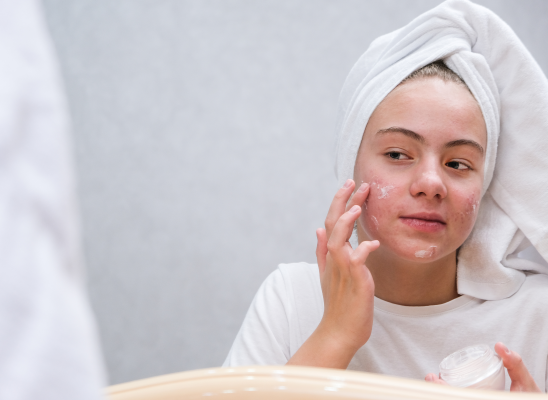Medication for Skin Picking Disorder: Are There Options?

Online test
Find out the severity of your symptoms with this free online test
If you or someone you love lives with skin picking disorder, clinically known as Excoriation Disorder or dermatillomania, you’ve probably heard that there is currently no FDA-approved medication to treat it. And that’s true. Therapeutic approaches like Habit Reversal Training (HRT) are the first-line treatment interventions. You’ve probably also heard that certain medications are sometimes used along with therapy to treat skin picking. That is also true.
When you’re looking for answers and options for treatment, that can all be very confusing. A comprehensive new review, examining nearly two decades of research, offers some encouraging answers. Their findings provide valuable insight and guidance in the treatment of skin picking disorder.
What the Research Found
The researchers reviewed 192 studies and narrowed them down to 13 high-quality studies involving 289 patients. These studies tested a wide range of medications, from antidepressants to supplements to other psychiatric medications. The goal of the review was to see which medications might be most promising in the treatment of skin picking. And the results are promising.
SSRIs
A specific class of antidepressants known as selective serotonin reuptake inhibitors (SSRIs) emerged as the most promising option. SSRIs consistently showed the best results in reducing both the severity and frequency of skin picking episodes.
Why do SSRIs help? While the exact mechanisms are not fully understood, SSRIs affect serotonin levels in the brain. Serotonin is known to play a role in mood, impulse control, and repetitive behaviors. For some people with skin picking disorder, this change in serotonin seems to help quiet the intense urges that drive the picking behavior.
Importantly, the research suggests that SSRIs work even better when combined with therapy. Rather than viewing medication and therapy as competing approaches, the evidence supports using them together for maximum benefit. Medication can help reduce the biological urges, while therapy can provide practical tools and strategies for managing triggers and emotions.
NAC
The review found that a supplement called N-acetyl cysteine, or NAC, has shown to be an effective treatment for some people. NAC is the supplement form of the amino acid cysteine. It plays a significant role in antioxidant production, in particular, glutathione, and modulation of glutamate. Glutamate dysregulation and glutathione have been shown to be associated with a number of mental health disorders including skin picking.
NAC works differently than antidepressants, affecting a brain chemical called glutamate that's involved in habit formation and impulse control. It is available over the counter and is generally well-tolerated, making it an accessible option for many people.
Other Promising Options
SSRIs are not the only types of medication that have been studied. Some other medications show promise too.
Memantine
Memantine has been in the news recently for its use in treating Alzheimer’s Dementia. More recently, it has gained attention as a possible pharmacologic intervention for treating BFRBs like skin picking due to its effects on glutamate. The review of studies found that people treated with memantine showed significant improvement in the severity of symptoms. At this time, memantine is not specifically approved to treat skin picking and research continues but results are promising.
Antiepileptics
Some studies looked at antiepileptic medications like lamotrigine and topiramate. These medications, traditionally used to treat seizures, affect brain activity in ways that might help with impulse control. The review found that while some studies showed positive outcomes, the literature is limited, and more studies are needed before it can be determined how helpful these medications might be treating skin picking.
Other Medications
The review included studies that examined other medications, including antipsychotics (often used alongside antidepressants), and naltrexone, a medication that blocks certain receptors in the brain associated with reward and urges. While these medications showed some benefits in studies, the evidence for use in treating skin picking wasn't as strong or as consistent as it was for SSRIs and NAC.
The Takeaway
So, what do the review findings mean for treatment?
The findings suggest that medication can be an effective part of a comprehensive treatment plan for some people, with SSRIs and NAC seeming to enjoy the most empirical support. Research consistently shows that combining medication and therapy tends to be more effective than medication alone. Think of medication as helping to turn down the volume on those intense urges, while therapy teaches you new ways to respond to those urges to pick. You and your care provider can determine the best approach for you.
Remember, skin picking disorder is a real medical condition, not a character flaw or lack of willpower. If you’re ready to take control of your skin picking, SkinPick is here to help. We have a team of experienced therapists who can help you find the treatment and strategies that are right for you. With the right support and treatment plan, recovery is possible, and help is available.
References
1. Modanlo, N., Yan, X., & Bourgeois, J. A. (2025). Pharmacologic management of skin-picking disorder: An updated review. Journal of the Academy of Consultation-Liaison Psychiatry, 66(5), 417-428. https://www.sciencedirect.com/science/article/pii/S2667296025004835
2. https://my.clevelandclinic.org/health/articles/22839-glutamate
3. Memantine May Reduce Hair-Pulling, Skin Picking. (n.d.). Retrieved from https://psychiatryonline.org/doi/full/10.1176/appi.pn.2023.05.5.29
Online test
Find out the severity of your symptoms with this free online test
Start your journey with SkinPick
Take control of your life and find freedom from skin picking through professional therapy and evidence-based behavioral techniques.
Start Now



